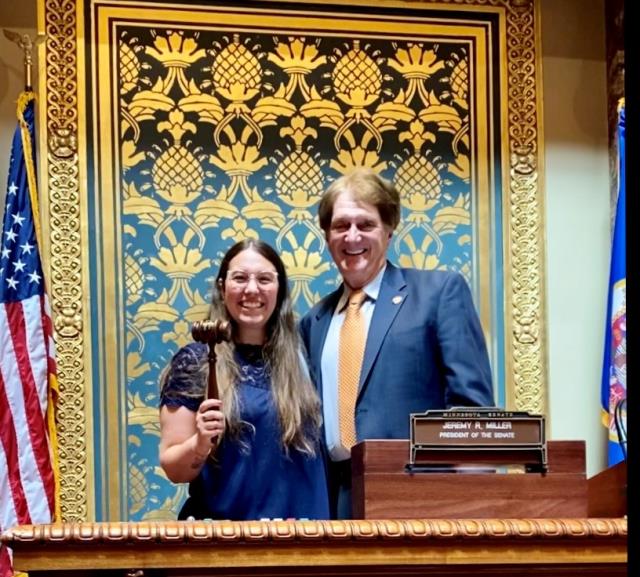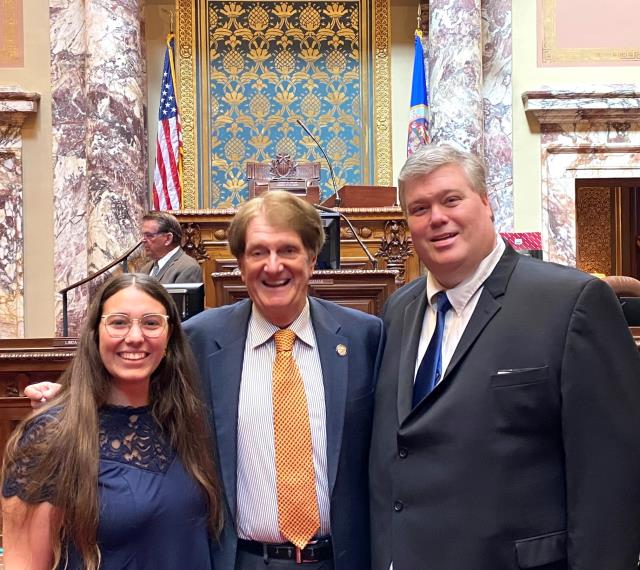|

I was happy to host a visit to the Minnesota Senate by Keshet Berlinsky Edry, the Emissary (or "Shlicha") from the Jewish Agency for Israel to St. Paul.
She is one of 1,750 emissaries that the Agency has sent from Israel to communities in 65 countries across the globe.
During her tenure living and working Ramsey County, Edry has led hundreds of educational, social and cultural programs in our community.

Edry was accompanied by Assistant Chief Administrative Law Judge with the Minnesota Office of Administrative Hearings Eric Lipman, who served in the Minnesota House of Representatives from 2001 to 2004.
Dear Friends and Neighbors,
This week we convened a special legislative session to finish the work necessary to create a final budget for our state.
While the House and Senate have different priorities, we are united in our shared commitment to getting our work done on time, and to ensure that our final budget meets the needs of Minnesotans throughout the state.
Right now, several committees have finished their work in their budget area, and they await passage in the House.
Once these bills are passed in the House, they will come over to the Senate for passage and move onto the Governor for his signature.
While divided government can make things challenging, these agreements represent compromises that are positive and healthy for good government.
We still have work to do to finish a handful of outstanding budget areas, including the education budget.
Supporting our students and teachers has always been my biggest priority at the Legislature, and I continue to advocate on their behalf.
I am optimistic that by the end of our negotiations we will have made strong improvements to our education budget that will help address both the short-term needs resulting from the effects of COVID-19 and the long-term issues that have required strong investment.
Things do remain fluid, but I am optimistic that we will be able to get our work completed next week. Our biggest priority is making sure that the budget is done by July 1 to avoid the risk of any government shutdown, and to ensure that we continue our strong recovery.
As always, please reach out to me with any questions, comments, or concerns. Though our special session will conclude soon, my office remains open to help or assist with any issues you may be facing. Do not hesitate to reach out!
Best,

Higher Education Update
The tentative Higher Education Funding and Policy Agreement provides a 50% funding increase over the original Senate budget bill passed in May.
The working group agreement target of $100 million provides funding to the University of Minnesota and MinnState systems, including Century College.
The bill also expands the state grant program, Hunger Free Campus appropriation, money to recruit more students of color into teaching, and a new program to provide higher education opportunities for children who have been in foster care. (SF 18)
Other highlights include:
· Increased state grant funds will help more students.
· Th Assigned Family Responsibility (AFR) and Living and Miscellaneous Expenses (LME) percentages changes will also provide additional state grants dollars to more students and result in higher grant awards for low-income students and their families.
o These changes will have the following impact:
§ 2,782 new student grant recipients
§ Average grant increase: $87
§ 46% of new students will be from families with incomes below $40,000
§ Average grant for these students: $67
· MinnState cannot increase tuition by more than 3.5% in the next two academic years. MinnState administration has agreed to this provision.
· College Possible program will receive increased funding to expand its reach in Minnesota.
· Z-degree textbook program gets a boost to help students afford college educational materials.
· A new grant program will provide funds for foster care students to afford college tuition.
· Hunger Free Campus designation and grant programs will help students who face emergencies stay on track and in college.
· Two grant programs and a new scholarship program will help bring more students of color into teacher prep programs and Minnesota classrooms.
Commerce Bill Update
The Commerce portion of the Commerce and Energy Budget Omnibus Bill includes compromise negotiations with several important changes.
Among the most impactful is a new Student Loan Borrowers Bill of Rights, a policy that my colleagues and I have championed for several years.
The new law will require loan services to obtain a license to lend in Minnesota and imposes several requirements on them, including:
o Requires timely responses to borrowers’ written communication
o Requires servicers to apply overpayments as instructed by the borrower
o Requires servicers to apply partial payments in a way that minimizes late fees and the negative impact on the borrower’s credit history
o Requires servicers to evaluate borrowers for income-driven repayment program eligibility before placing them in forbearance or default
o Prohibits servicers from engaging in unfair or deceptive practices; from attempting to mislead a borrower; from knowingly misapplying payments; from providing inaccurate information to a consumer reporting agency
o Allows the Commerce Commissioner to examine student loan servicers as necessary and take action against a licensee, including barring a person from servicing loans
o Applied student loan contracts executed on or after Aug. 1, 2021
The bill also provides the Department of Commerce authority to enforce current laws surrounding children’s toys containing toxic chemicals. Currently, the Department receives many complaints about this matter but has no real authority to enforce corrective action.
There also will be a new Catalytic Converter Theft Prevention Pilot Program in Minnesota, providing funding to targeted areas to mark cars’ catalytic converters with unique identification numbers to deter thieves.
The bill still contains a problematic new barrier to requiring health insurance companies to cover certain treatments or conditions. However, the agreement no longer contains an expensive, short-sighted reinsurance extension that would have cost taxpayers at least another $150 million without any guarantee of meaningful health care reform.
The federal American Rescue Plan will make insurance premiums more affordable for individuals purchasing on the open market this year.
At the time of this writing, the Senate had debated the bill and continues to wait for the House of Representatives to officially send the bill for final passage. It is expected to be signed by the governor. (SF 19)
Energy Bill Highlights
The budget for the Energy Committee was among those finalized this week.
The bill provides funding for projects such as closed captioning services for legislative coverage, settling a state obligation that will allow solar to be placed on the closed Anoka-Ramsey Landfill, establishing an Energy Transition Office to support communities and workers impacted by closed energy facilities, and establishing the Natural Gas Innovation Act.
In addition to the general fund appropriations, the bill also includes spending from the Renewable Development Account for projects that promote the startup, expansion, and attraction of renewable energy projects and companies.
Included among these projects:
· Funding for solar projects at schools and state colleges and universities. Forty percent of the funding for schools located within Xcel Energy service territory is prioritized for those schools that provide free and reduced-price lunch for 50% or more of their students
· A pilot project in North Minneapolis that would establish a clean energy career training center to provide training pathways into the clean energy job sector for students and young adults in underserved communities
· A revolving loan account for conservation improvements to state-owned buildings
· Two studies: one to examine the environmental impacts of certain construction materials and the economic feasibility of prioritizing their use in state buildings, and one that generates weather model projections for the entire state for agricultural purposes
· Research funding for the University of St. Thomas for expanding microgrid testing and hands-on educational opportunities to university students and students of partnering community colleges
· Funding for the University of Minnesota for research and development of energy storage systems that utilize ammonia from renewable energy sources and other sources of clean energy
The bill also includes several policy changes that were among DFL priorities, including an extension of the Cold Weather Rule period by several weeks, to cover October 1 through April 30, and a framework known as the Minnesota efficient technology accelerator that would enable certain nonprofits to work with businesses and utilities to accelerate the adoption of emerging efficient technologies.
The House is anticipated to pass the legislation late in the week, and it will then need to be sent to the Senate for the body’s approval before it is able to become law. (SF 19)
Legacy Bill Update
An agreement reached among the Legacy Finance Committee leadership brought the bill one step closer to becoming law this week.
If passed, the legislation would appropriate funds from the four ‘legacy’ funds that were established by Constitutional Amendment approved by Minnesota voters in 2008.
The four funds – the Outdoor Heritage Fund, the Clean Water Fund, the Parks and Trails Fund, and the Arts and Cultural Heritage Fund – were established to provide ongoing support to projects across the state that protect and enhance water quality, provide access to the arts, preserve Minnesota’s rich history and cultural heritage, and maintain our parks and trails.
The legislation is typically bipartisan. It is widely celebrated for the deep investments it makes in projects for protecting and enhancing our environment and outdoor recreation. Plus, it supports our state's rich culture and history.
This year’s bill contains the recommendations from the Lessard-Sams Outdoor Heritage Council; provides equitable funding for state parks, Greater Minnesota regional parks, and metro parks; largely includes the recommendations from the Clean Water Council; and provides sizeable investments in many different arts and history projects, including $5 million in competitive grants for community identity and heritage programs.
The House is expected to take up the Legacy bill late in the week and, once passed, will send it to the Senate for a chamber vote. If approved by both bodies, it will be sent to the governor for his signature. (HF 13)
Agriculture Bill Update
The pandemic has been difficult for everyone across the state, but especially so for our farmers.
The state’s meat processing plants struggled as workers contracted COVID-19 and plants had to be closed for cleaning and quarantine, leaving farmers with nowhere to send their animals to be processed.
Financial problems cropped up with the economic downturn, and the mental health of farmers suffered even more – all this on top of trade wars, global competition, and the other challenges our farmers face every day.
To address these difficulties my colleagues and I were able to increase the budget target for agriculture, allowing us to invest in mental health resources for farmers, biofuels, emerging farmers, and urban agriculture, and more. (SF 25)
|